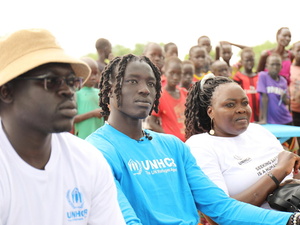North Caucasus Update
North Caucasus Update
More UNHCR aid to Ingushetia
UNHCR on Tuesday dispatched its 19th aid convoy to Ingushetia, sending 34 trucks carrying more than 240 tons of food as well as bedding materials, clothing, hygiene items and children's gifts for displaced people from Chechnya.
In all, 22 UNHCR convoys have been sent to the North Caucasus since mid-September. UNHCR has provided more than 5,000 tons of relief (2,600 tons of food and 2,500 tons of non-food items) for tens of thousands of internally displaced people (IDPs) who fled Chechnya since the outbreak of hostilities in the region in August. In addition to the 19 convoys to Ingushetia, two have been sent to Dagestan and one to North Ossetia from UNHCR's base of operations in Stavropol, southern Russia.
IDP Numbers
There are no reports of increased numbers of IDPs fleeing to neighbouring republics since Russian forces stepped up their military assault on Grozny. Estimates of the remaining civilian population in Grozny range from 10,000 to 50,000 people. UNHCR remains seriously concerned about the fate of the civilians remaining in Grozny, many of whom may not have the ability to leave the city.
Official government figures on total arrivals place the number of displaced people who have fled to Ingushetia at 254,000. However, more than 50,000 of these people have gone back to Chechnya, primarily in the north, and to other parts of Russia. Another 28,000 displaced are reported in Dagestan, while an unknown number remain in Chechnya itself.
Security Arrangements
The implementation of Russian security arrangements for UNHCR in the North Caucasus has allowed international staff members to spend more time in the region determining the needs of IDPs and local host families.
A UNHCR team which spent almost a week in Ingushetia visited several camps, makeshift settlements and host families. The team reported that everyone they visited had food, although not necessarily items they preferred. Still, availability was not an issue. Heated shelter was also generally available for IDPs, in camps as well as in makeshift settlements. Water was generally available, although its quality was sometimes questionable.
The team recommended the immediate increased supply and distribution of warm clothing and shoes, particularly for vulnerable IDPs. It also urged provision of more medicine and of food for host families, which are housing nearly 180,000 IDPs. Other needs include more winterized shelter, site preparation and adequate sanitation facilities.
Distribution and Monitoring
UNHCR, in conjunction with the Danish Refugee Council and various other implementing partners, now has nearly 100 predominantly local staff working in Ingushetia. This increase in staff provides UNHCR and its partners with a much better distribution and monitoring capacity in the region.
UNHCR has also boosted its staff in Stavropol, southern Russia - the logistical base for relief operations in the Northern Caucasus. An expert on shelter, water and sanitation has been deployed. An emergency field coordinator is in place in North Ossetia. Other U.N. agencies also started deploying staff in Stavropol, including a World Health Organization official.
UNHCR is coordinating the aid operation with other U.N. agencies and the International Committee of the Red Cross. At least 19 NGOs also have approached UNHCR about launching relief operations in the North Caucasus.
Protection Concerns
While the material needs of the displaced persons have been assessed and assistance measures are being stepped up, UNHCR remains concerned about some key protection issues.
In Ingushetia and Dagestan as well as in other parts of the Russian Federation, the legal status of Chechen IDPs has not been established. Despite a relevant provision in Russian law, their documentation and entitlements remain to be defined.
UNHCR has received assurances from Russian officials that the voluntariness of any returns to Chechnya will be respected. This follows reports that authorities had withheld ration cards from IDPs in a bid to get them to return to parts of Chechnya. In another instance, railcars in which IDPs had been living in Ingushetia had been towed a few kilometres into Chechnya. Russian officials have assured UNHCR that these incidents were based on misunderstandings and that coercion will not be used in future.
Funding Update
Following High Commissioner Sadako Ogata's November mission to Russia on behalf of Secretary-General Kofi Annan and subsequent discussions between the Secretary-General and heads of U.N. humanitarian agencies in Geneva, the U.N. in late November launched a joint emergency funding appeal for nearly $16.2 million.
UNHCR is seeking the largest component - $8.3 million. Of this required amount, UNHCR had received $7.9 million by 20 December, including contributions from the European Community Humanitarian Office (ECHO), Canada, Denmark, Finland, France, Germany, Norway, Japan, Switzerland, the United States and some charitable organizations.
As of 25 December, UNHCR had procured, dispatched and distributed food and non-food items valued at more than $5 million.









